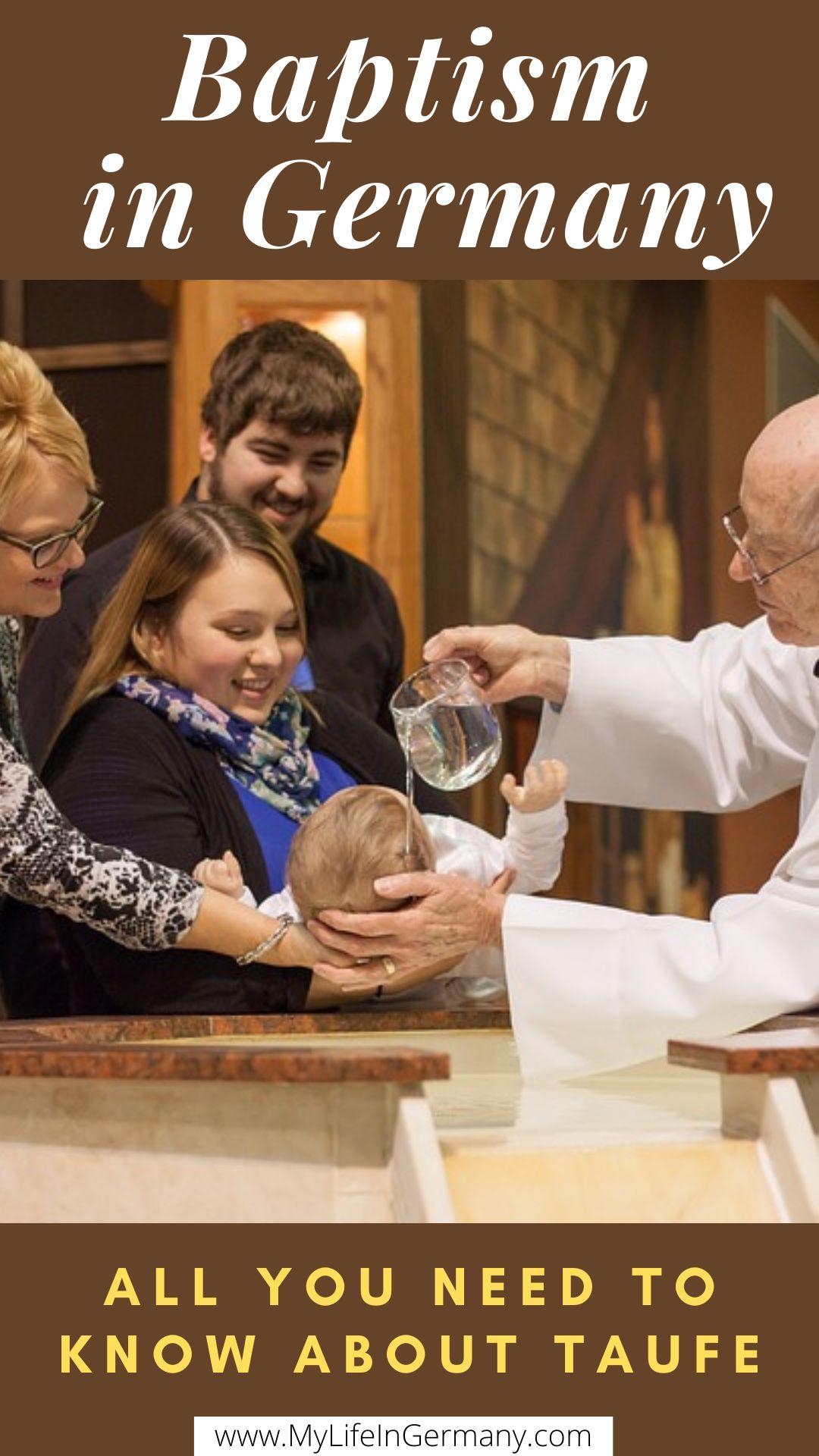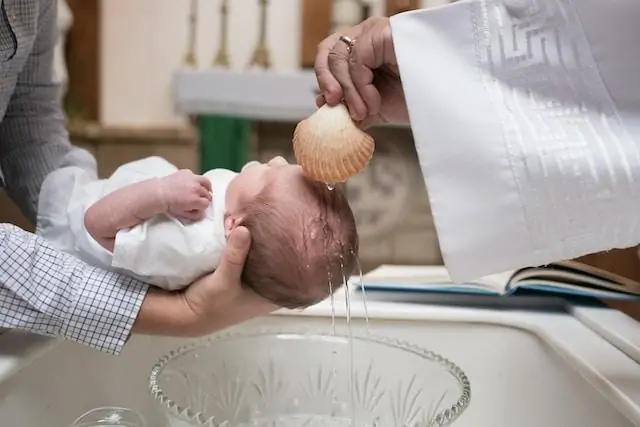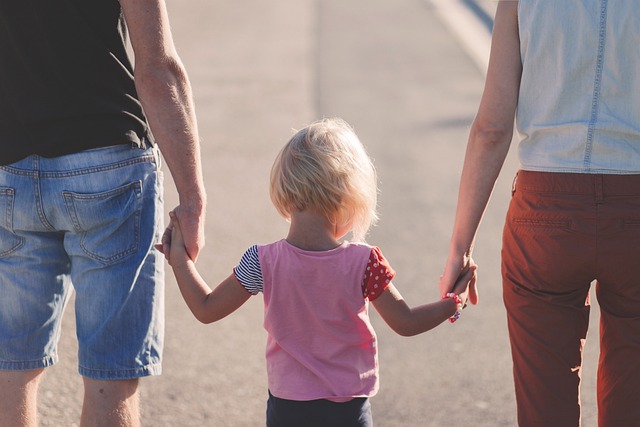This post contains affiliate links. It means that if you click on the links and make a purchase, we will receive a small commission at no additional cost to you. This allows our blog to continue providing you with free information. We only include links and products that we truly believe in. You can read the full disclosure here.
Moving to Germany or new in Germany? Check out our Resources Page for all the help you need!
Let’s get into the world of baptism in Germany! Learn about godparents, what baptism (Taufe) really means, and how young Germans handle traditions like confirmation and communion. Find out how they mix faith, family, and fun in these important moments of their lives.
Table of Contents
ToggleIntroduction
During the 13 years when I lived in Germany, I’ve been to three baptisms there. All for my awesome nephews. Two of them got baptized when they were just a few months old. I was even chosen as the godmother of one of them!
This summer, I was back in Germany for a visit. Guess what? I got to attend the baptism of my third nephew.
This nephew is three years old already. Yeah, a bit older than the usual baptism age. Thanks, Corona, for throwing things out of whack for the past couple of years.
As you know, I originally came from Hong Kong. Back there, baptism wasn’t really a thing I knew much about. But after moving to Germany, I found out that it’s a pretty big deal there.
For those of you who, like my old self, might be scratching your heads about what this whole baptism deal in Germany is about. Don’t worry. I’m here to break it all down for you in this article.
What is baptism in Germany?
Coming from Hong Kong myself, I was not familiar with the concept of baptism (or “Taufe” in German). After moving to Germany, I realized that baptism is a big deal. For those who are not familiar with this concept, I am trying to explain briefly here what is baptism.
Baptism is an important tradition in Germany related to Christianity. It shows a spiritual journey. Like in the Bible, many parents in Germany get their babies baptized to keep them safe with God. This happens when babies are a few months old. Water is poured on their heads, like a special washing.
For grown-ups, baptism is even more special. Baptism helps believers feel close to Jesus’s story of dying, being buried, and coming back to life. Being baptized is like saying you believe and want to follow Jesus. Some adults even go into the river in Germany to get baptized!
The baptism ceremony is usually followed by a big family celebration in Germany. All the important family members gather and spend a nice afternoon together with food and drinks. The kids play with each other and the baptized baby/ kid is showered with lots of presents from the family.
Read also: German Parenting Style: What are the Secrets?
Why is baptism usually done for babies in Germany?
Baptism is often done for babies in Germany because it’s seen as a way to welcome them into the Christian faith and community right from the start. In many Christian traditions, baptism is seen as a way to clean a person’s soul and mark the beginning of their connection with God. By baptizing babies, parents are making a promise to raise their children in the Christian faith.
I once heard in Germany that some Christian people believe that a person needs to be baptized before they can go to heaven. That’s why some people want to baptize their babies as early as possible. They think that in case something happens to the babies, baptism can ensure that their babies can still go to heaven.
I am not familiar enough with the Christian belief to tell if that is true or not. The opinion seems to vary across different Christian beliefs. So, if you are Christian and you know more about this, share your view by leaving a comment under this article. 😊
My nephew just got baptized this summer
As I mentioned earlier, we were visiting Germany this summer. Coincidentally, my nephew’s baptism was happening at that time too. So, we got to attend his baptism ceremony.
He’s not a baby anymore – he’s three years old. But because of Corona messing things up the past couple of years, he couldn’t get baptized earlier. Finally, things were back to normal, and he could do it, even though he was a bit older now.
This time was pretty cool because they did the ceremony outside the church, not inside. The church had a big playground outside. They set up chairs and shelters outside so the grown-ups could sit and listen to the speeches and singing from the church folks.
Meanwhile, the kids could play on the playground right there. It was handy because I remember the last baptism I went to was held inside the church in Germany. And it was a struggle for parents with active kids. But this time, the kids had space to play, and the adults could enjoy the ceremony.
Oh, and about my nephew’s ceremony – they put water on his head, and he wasn’t having it. He had his teddy bear, and he kept trying to avoid the water and even put his teddy bear on his head to block it. It was hilarious.
After that, we all headed to my sister’s and brother-in-law’s house for a big celebration. They had a barbecue, loads of cakes, sweets, and drinks. We hung out there for the whole afternoon and had a nice time.
Wondering what you should bring as a gift to a baptism in Germany? You can ask the parents for ideas or check out this gift guide in Germany!
What does it mean to be a godparent?
In Germany, godparents are usually chosen by the parents during the baby’s baptism. But what does it mean to be a godparent?
When a baby gets baptized in Germany, godparents have a role in the ceremony. It’s not just a fancy title – you’re making promises to be a special guide for the kid in their life. It’s quite a big deal and comes with some responsibilities.
Being a godparent means you’re a positive role model that the kid can look up to, kind of like a cool aunt or uncle. You get to show them how to be a good person with the right values and be there for important moments like birthdays and special events.
They might come to you for advice when they’re not comfortable asking their parents, and you’ll build a close bond by spending time with them.
It’s not a short-term thing; you’re in it for the long term as the kid grows up, even into their adult years. Being a godparent is a significant responsibility, like a guiding star on their life journey. And yes, this also means that you are expected to give holiday presents to the kid.
Sometimes, godparents might also have a legal role if something happens to the parents. You’d be like an extra guardian to make sure the kid is okay. So, being a godparent isn’t just a title – it is quite some responsibility and one should consider carefully before becoming one.
Do godparents in Germany really do all those responsibilities?
Whether a godparent really does their stuff depends on them. Like, some godparents are awesome – they’re on it, doing all the things they’re supposed to. They treat the kids like their own, spend time with them, and all that good stuff.
But then, you’ve got the ones who just don’t really do much. So, parents have to be super careful when they pick a godparent. It’s kind of smart to choose someone who lives close by. But life’s tricky. People move away sometimes.
Take my husband and my sister-in-law, for example. My husband’s got this aunt who’s his godmother. She’s been great – always hanging out with him when he was a little kid, sending gifts for all occasions, and just being there.
On the other hand, my sister-in-law also has a godmother who’s her aunt. But she was not doing much with her. Sometimes, godparents simply become distant from the kid.
It depends also on the relationship between the parents and the godparents
It might start off all good when the kid’s born because the godparents are still close to the parents. But over time, the relationship between the parents and godparents can grow apart. It also means that the godparents stop being involved with the kid.
So, you see, it really depends. That’s why I think it’s better to pick godparents who live nearby and are family, like relatives, rather than just friends. Friends can come and go. After some years, they might not even be friends anymore. And then they won’t care much about the kid.
Let me tell you about my husband’s situation. He’s still tight with his godmother. Even though she moved like three hours away from us when we lived in Germany, he still makes sure to swing by whenever he’s in town. So, yeah, it’s a bit of a mixed bag. But when you find good godparents, it’s pretty cool.
I became the godmother of my nephew a few years ago
Back in my hometown, Hong Kong, we don’t do this godparent thing for babies. When I was in Germany a few years ago, my sister-in-law asked my husband and me to be godparents for her kids. We got this card invite, and we didn’t have to decide right there. We had to think about it and make sure we were up for it.
I had no clue what being a godparent meant, so I chatted with my husband. I didn’t want to say yes if I couldn’t do it. So, I asked him, “What’s the deal with being a godparent?” They live like 5 hours away from us, so I wasn’t sure about my role.
I’d heard that if the kid’s parents died in the future, we’d have to take care of the kid. That’s mega responsibility. I can’t say yes now because stuff could be different in the future.
If their parents die after a few years, it can be a whole different situation than if they die now. I was not sure how many kids I would have, and what would be my financial situation by then.
So, it’s a tough call.
I talked to my sister-in-law again, and I told her what I was thinking. Turns out, legally, we won’t become the kid’s guardians if something happens to them.
It’s just a ceremony, a procedure.
Saying yes means they’ll write our names down in the church records. But we won’t have to take the kid when things go south if we don’t want to.
That was a big relief. I was like, “Okay, that’s cool.”
Then I asked my husband, “What else do I need to do if we say yes?”
He said we’d have to give gifts for everything – Christmas, birthdays, you name it. Since we’re so far away, sending presents would be the least we could do.
So, in the end, we said yes to being godparents for my nephew. During the baptism, we had to step outside because we were the godparents. And we needed to see all the action.
Now, my husband makes sure to send gifts because we live far away. Even though we’re not super involved in the kid’s life, we’re part of it in our own way. Being a godparent kinda feels like making sure the kid gets gifts. You pick godparents who can afford presents.
It’s like that with my husband – he’s also the godfather of another nephew of his. He always sends loads of gifts, even money. This summer, we visited his nephew who turned 11 years old. My husband gave him a gift plus a 100 Euro bill.
I was like, “Is this normal?”
Because back when I was a kid, I had never got that amount of money at that age. Maybe because of inflation? Who knows.
What is confirmation/ communion in Germany?
Remember we say that babies usually get baptized in Germany? But babies were too young to realize what it means with baptism. They are not conscious yet to confirm that they believe in god.
That’s why there are these Christian events called “Confirmation” and “Communion” in Germany. So, Confirmation is when teenagers, usually around 14 or 15, publicly say, “Yeah, I’m down with this faith stuff!” And then there’s Communion, where everyone shares some bread and grape juice (or wine) to remember Jesus and feel all connected.
These events give a chance for the person to consciously decide to believe in god. They are pretty meaningful for Christians in Germany. There is usually a family party afterward and a lot of gifts for the kids who confirm themselves.
Are you invited to a confirmation/ communion in Germany and don’t know what you should bring? Check this out: Gift Giving in Germany – Do’s and Don’ts (+ Gift Ideas)
Are young German people religious?
From what I’ve seen in Germany, sometimes even if the parents aren’t super religious, they still go ahead to baptize their kids. And even the kids themselves, when they confirm or have communion, it doesn’t always mean they’re super into religion.
Lots of people do it because it’s a tradition or everyone they know is doing it. I know some people in Germany who did these things even though they’re not super religious. It’s kind of like, “Well, everyone’s doing it, so why not?”
For example, my husband went through Confirmation at 14. But he told me he wasn’t super into believing back then.
He said, “Hey, why not say yes? You get gifts and money!”
So, it’s not always about deep faith, sometimes it’s about getting cool stuff.
And when it comes to kids getting all dressed up for these events, they might not really care about the religious part. It’s like a mix of tradition and getting money and presents from family.
So, while some people do these ceremonies with genuine faith, for others, it’s kind of like a blend of tradition, social pressure, and perks like cash and gifts.
Of course, I am not talking about every young German people being like that. But at least many German people I met were like that.
It is similar to when a lot of German people are still paying the church tax in their payslips. It doesn’t necessarily mean that they are religious. Sometimes, they don’t even realize that they are paying the church tax.
Conclusion
So, that’s about baptism in Germany! From godparents being like cool guides to young kids, to the whole idea of getting wet or having water put on them. It’s a big deal in Germany. Some folks take it super seriously, while others see it as a mix of tradition, family, and maybe some sweet presents.
Pin it for later:

Have you been to baptism or confirmation/ communion in Germany? What do you think about them? Leave a comment below and share your experience!
Moving to Germany or new in Germany? Check out our Resources Page for all the help you need!
If you found this article helpful, consider supporting this website by buying me a coffee. Every small donation helps to keep this blog alive. You can also ask me any questions here. Buy me a coffee







